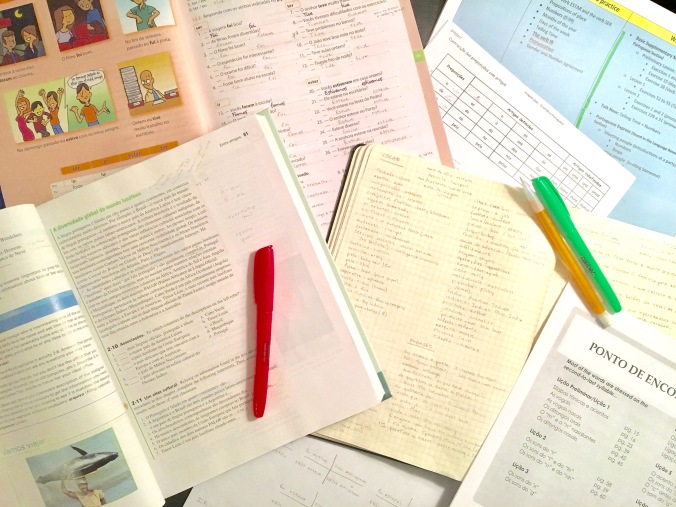
Português! O meo cérebro dói.
American diplomats “represent and protect the interests of the United States abroad,” and I’d argue that this mission falls into two categories. Bear with me now. On one hand, American diplomats push information out. They explain U.S. import policies to Italian business owners, ensure that Nepalese radio stations are reporting correct information about the United States, and encourage Ethiopian students to study at American universities. They are master negotiators and effective communicators. On the other hand, American diplomats pull information in. They are the United States’ eyes and ears on the ground and report back to Washington on the political and economic environment in more than 190 countries around the world. They know whether clean water or new schoolbooks are needed in a rural community in Liberia, or which political party in India is most likely to win the next presidential election, or whether a country is deteriorating into civil war. Even more importantly, they know how each of these issues will impact the safety and prosperity of the United States.
“Thank heavens these issues don’t affect me,” you think. But they most certainly do! Because it is a diplomat who helps make it safe for you to travel abroad. It is a diplomat negotiating the treaty that prevents sending American troops to war. It is a diplomat who determines which foreign individuals will be granted visas to enter the United States. It is a diplomat who dissipates anger against the United States with careful communication.
Despite having done vast amounts of research prior to joining the State Department, I’m still boggled by how many issues the State Department’s 13,980 diplomats manage to juggle. That being said, there are five types of diplomats who obtain, process, and communicate all this information. As described by the State Department, the five career cones are:
- Consular: Consular Officers facilitate adoptions, help evacuate Americans, and combat fraud to protect our borders and fight human trafficking.
- Economic: Economic Officers work with foreign governments and U.S. agencies on technology, science, economic, trade, energy, and environmental issues.
- Management: Management Officers are resourceful, action-oriented leaders responsible for all embassy operations from real estate to people to budget.
- Political: Political Officers analyze host country political events and communicate effectively with all levels of foreign government officials.
- Public Diplomacy: Public Diplomacy Officers engage, inform, and influence foreign societies in order to promote understanding and support of U.S. policies.
While I am officially a Public Diplomacy Officer, I will serve as a Consular Officer in Cabo Verde. Which means that in only a few months, I’ll be giving visa interviews in Portuguese. Gulp.
Tenho certeza que você vai fazer muito bem.
Full disclosure: thank you G Translate.
Dear Gigi, good to hear from you and your explanation about your new job. We might have thought diplomacy wasn’t such an important subject these days. But here you are. Only a few months, but how long before you go? Good luck with your exams (and how we say in French when not wanting to jinx anything “merda” ( this is actually in Portuguese)).
Hugs from NYC.
LikeLiked by 1 person
Obrigada, André! Google Translate is a lifesaver, that is for sure. And if all goes as planned, I’ll be leaving in October – um abraço!
LikeLike
Congratulations m’y dear Gigi! It is going to be a wonderful experience!!!! Love
LikeLiked by 1 person
❤
LikeLiked by 1 person
Hi, this post is very informative, thank you.
Although, I have a couple of questions about what a diplomat thinks (that could be your next post, here is an idea). I am assuming you had to swear on the Constitution saying you’ll do (almost) everything to represent the interests of your country abroad.
So :
* Is being a diplomat a sort of vocation, something you could do and be paid a minimum wage at the same time, or is it more of a comfortable fancy government job ?
* Would you acknowledge the U.S. mistakes abroad ? Would you always feel blindly proud of being American, because you are a diplomat ? Will you still be able to openly criticize the actions of your own government, even if this could be a threat to the future of your career ?
* Regardless of the appealing salary you will probably be paid, why being a diplomat was the job you wanted to have ? What can you bring to the U.S. foreign policy ? How could you change it ? Why would you like to change it ? And, do you want to change it ? If you do not want to bring something new to the U.S. foreign policy, isn’t being a diplomat a sort of “political job”, therefore, a threat to democracy ?
* If being a diplomat is a representative job, and if a diplomat is an actor in the representative democracy, shouldn’t be the diplomats elected, and not selected based on their resumes, and a competitive exam that aims at grading their charismatic powers ?
I am a college student and I really wonder about all of this. I know these questions are asked in quite a violent way, but I do not want to edulcorate my words, otherwise I would not get a honest response, or the type of response I am expecting from you. My goal truly is to have some information about what a diplomat could think about his own job, especially a U.S. diplomat.
Thanks for considering writing me back.
Sepideh
LikeLike
Hi Sepideh,
These are great questions. I’m impressed that you took the time to reach out. Do you have an email address to which I could respond? I’d be happy to discuss your above points.
Hope to hear from you,
Gabrielle
LikeLike